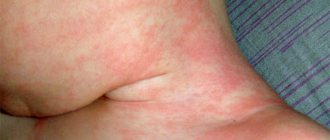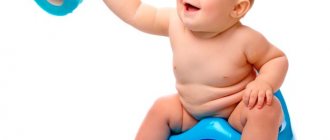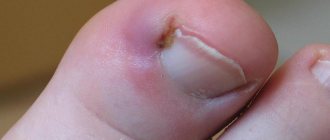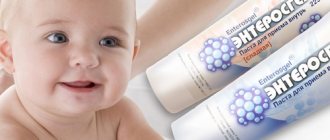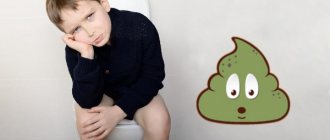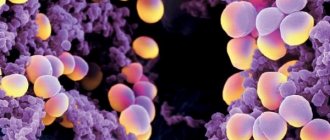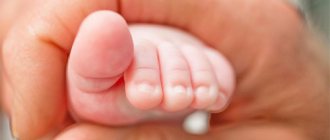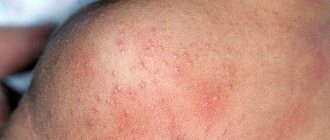If parents notice that their child’s hands and feet are sweating, but have not previously been bothered by this symptom, they should show their baby to a doctor, because sometimes hyperhidrosis is a sign of the development of an unsafe internal disease that requires timely diagnosis and treatment. Wet palms and feet may be a consequence of ordinary overheating; in this case, you should reconsider your principles and beliefs and learn to dress your baby according to the weather.
Sweating - features of the mechanism
Sweating is a natural process that occurs in the body of every person. It is impossible and unnecessary to eliminate it completely, since the coordinated work of the sweat glands is of great benefit: thanks to the secretion of sweat, excess moisture, toxins and other harmful substances are released from the body.
Sweating is observed on different parts of the body, but the process is more noticeable on the armpits, soles of the feet and palms. If increased sweating occurs, it is necessary to identify its cause. It can be both physiological and pathological.
Symptoms
In some cases, excessive sweating of the hands may indicate quite serious problems. To suspect them, you need to pay attention to the following signs:
- Not both hands sweat too much, but only one;
- During sweating, an unpleasant odor occurs;
- sweat changes smell and consistency during feeding, becomes too thick or thin;
- sweating of the head occurs;
- the child becomes restless, his sleep is disturbed;
- Excessive sweating occurs at night.
Etiology
Sweating hands and feet in children is not a reason to panic. If the baby is a newborn, then this fact is explained by the imperfection of the thermoregulation process in the body. This is a normal phenomenon that goes away on its own with age.
This fact has a simple explanation: during intrauterine development, the body does not need to control temperature, the fetus is in the same conditions. When a child is born, he or she is faced with changes in temperature. Sweating is observed during the adaptation process.
Also, the reason why a baby’s feet are wet is the parents’ excessive care, which manifests itself in the form of a desire to provide the baby with warmth when it is not required. Mothers often wrap their children up, fearing that they will catch a cold, or create a hot climate in the house, thinking that it will be more comfortable for the baby. As a result, the child begins to sweat profusely.
Stress is also a common physiological cause of the development of hyperhidrosis. During a stressful situation, the body actively produces adrenaline, which leads to severe sweating. When experiencing stress, the first thing to sweat is your palms.
Should you worry and when should you worry?
The palm may become sweaty after intense play or walking, this is a direct factor in hyperhidrosis. But if wet limbs are a constant companion to physical activity, then it is better to show your child to a doctor.
Excessive sweating often becomes the body’s response to nearby heat sources, stressful situations, and changes in living conditions. But this is a completely adequate response of a child’s body. But if the reactivity of the thermoregulatory system goes beyond the norm, then a visit to a specialist should be urgent.
Diseases accompanied by sweating
Among the pathologies that can provoke the development of hyperhidrosis, the following are noted:
- Vegetovascular dystonia. This condition is characterized by various manifestations associated with dysregulation of the nervous system. These include increased sweating. It occurs due to the child’s excessive activity and nervous excitability.
- Rickets. The disease occurs due to a lack of vitamin D in the baby’s body. A person receives this element to a greater extent through sunlight, and less through food. When the component is deficient, disturbances occur in the process of mineralization of bone tissue. The pathology is accompanied by unpleasant symptoms: fearfulness, irritability, mental retardation, sleep disorders, sweating.
- Infectious diseases. Colds, acute respiratory viral infections and other pathologies can cause sweat to form on the baby’s arms and legs.
- Endocrine system disorders. When the thyroid gland malfunctions, disorders occur in various organs, so immediate examination and treatment of the abnormality is required.
- Parasitic pathology. Palms and heels may be wet if the child has worms. These parasites produce waste products that the body tries to remove from the body by excreting large amounts of sweat.
It is important to eliminate infections completely, since untreated diseases pose a danger to human health.
If there are no external factors influencing the sweating process, but sweat still forms, you should visit a doctor.
Self-treatment
Often parents are concerned that the legs (feet) and palms of infants and older children are constantly sweaty and smell unpleasant. You should not make hasty conclusions, buy a specialized remedy for sweating of the feet and palms and start self-treatment. Why? As mentioned above, sweating is a normal reaction of the body (especially in infants).
If the discharge does not go away within a few weeks, your feet and palms sweat excessively, become hot and smell unpleasant, contact your primary care physician. Do not self-medicate under any circumstances. With such therapy you can only harm your own child and aggravate the current situation.
Why? There is too great a risk of choosing the wrong anti-sweat product on your own, which can clog pores, cause an allergic reaction on the child’s feet and palms, and reduce the amount of the natural protective barrier on the skin.
After being diagnosed by a doctor, making a diagnosis and determining the list of recommended medications, you should conduct an allergic reaction test (except for oral medications, since the reaction to them is determined by the doctor). Any of the components of the medicinal substance (in the form of cream, ointment or spray against sweating) can harm the baby.
The test for an allergic reaction is carried out as follows: apply a small amount of the medicinal substance to the wrist or area behind the ear. After 40 minutes, check the test area. If redness, pimples, or pustules form there, do not use the drug in the future. Apply antiseptic cream or moisturizer to the inflamed area.
Diagnostics
To find out the reason for the formation of sweat on the palms and feet of a child, an examination is required. It is performed using the following methods:
- Study of sweat secretions.
- Blood test for general clinical and biochemical parameters, sugar, hormones, infections.
- Analysis of urine.
- Ultrasound examination of the thyroid gland.
If necessary, the doctor prescribes additional diagnostic methods. In each case, the list of examinations is compiled on an individual basis.
Ways to solve the problem
Many of the factors causing the problem are easy to eliminate. As a result, the problem will be completely resolved or the healing process will be accelerated.
Adviсe:
- Ventilate the room daily. Be sure to monitor the air temperature and humidity.
- Bath every day. You can simply wash your hands and feet with soap. A contrast shower at the end of water procedures will help keep your sweat glands toned.
- Every day, the baby is completely undressed for 15 minutes to take air baths.
- Gymnastics will help strengthen the functioning of the heart and endocrine system.
- For washing clothes, choose only hypoallergenic powders and soaps. Be sure to iron your clothes.
- It is best to choose clothes from cotton, linen, and wool. Change socks every day.
- Feed the baby breast milk for as long as possible. The diet of an adult child should be rich in vitamins and minerals. Salty, spicy, sweet dishes are excluded.
- Sweaty hands and feet should not be treated with greasy creams.
- It is not recommended to swaddle the baby tightly or use warm clothes.
- It is useful to add decoctions of medicinal herbs such as string, chamomile, and oak bark to bathing water.
- An atmosphere free of stress, conflict, agitation and anxiety should be created.
If, after eliminating visible factors, the problem still persists, you need to contact a specialist. First of all, go to the pediatrician, who will prescribe tests. Based on the results of the examination, further treatment can be carried out by specialized specialists, for example, an endocrinologist, an infectious disease specialist, a psychologist, a dermatologist.
Ways to eliminate hyperhidrosis
If a child’s hands and feet are sweaty for physiological reasons, you just need to eliminate them, and the process of sweat formation will normalize on its own. Parents should set the optimal air temperature in the room - no more than 22 degrees, and ensure the required humidity level of 60%.
It is also important to take children out into the fresh air every day, carry out water treatments, and change their linen. If sweating is a consequence of increased activity of the child, it is recommended to take herbal remedies that calm the nervous system.
If hyperhidrosis develops as a result of any pathology, then you should first address it. In this case, treatment tactics are selected individually depending on the identified disease.
Errors in nutrition
A child’s nutrition largely determines his healthy growth; his diet cannot be treated negligently. The tactic of overfeeding a child is also wrong, as is trusting the child in choosing a portion. It is necessary to accustom him to proper nutrition from an early age by adjusting his diet. The following mistakes can lead to onion sweating:
- Lack of vitamins D and C and calcium;
- Fast food and sweet carbonated drinks;
- Spicy and fatty foods;
- Lack of vegetables and fruits, replacing them with sweets.
Also, the child should drink a sufficient amount of clean water - tea, juices and compotes do not count. It is the one that is best removed from the body without leaving toxic substances. It is very useful to drink a glass of warm water on an empty stomach, 25-30 minutes before breakfast.
Important! A child can replace a snack at school, in the absence of a set lunch in the canteen, with fast food, chocolate and other unhealthy foods. Parents should take care of this when preparing snacks at home.
Prevention
The following recommendations will help prevent the development of hyperhidrosis in children:
- Personal hygiene. You can add herbal decoctions and infusions to the baths.
- Daily linen change.
- Refusal of synthetic clothing.
- Regular exposure to fresh air.
- Strengthening the immune system.
- Proper nutrition.
- Maintaining the air temperature in the apartment no more than 22 degrees and a humidity level of 60%.
If signs of rickets, endocrine system disorders or other pathologies occur, you should consult a doctor as soon as possible.
Emotional stress
Stress factors surround children from school age; they worry about grades and form their first social relationships. Many guys go to sections where you have to try for sports or creative results. You should not think a priori that a child’s body is highly resistant to stress - this can lead to problems. Nervous stress is expressed in increased blood pressure, temperature and loss of sleep. Stress causes sweaty palms, which only makes it worse, causing discomfort when communicating with other people.
Do you need a doctor?
If a baby under one year old's hands become wet, then the help of a medical specialist is not required. When a child from 3 to 10 years old suffers from increased sweating, it is worth contacting a qualified doctor.
If a little person’s wet hands are definitely not the result of excess weight, overeating or neglect of hygiene rules, then the mother needs to do this:
- visit a pediatrician;
- undergo an examination with your child, which will be prescribed by a doctor;
- if necessary, start treatment.
Only medical personnel can find out the exact cause of increased sweating.
